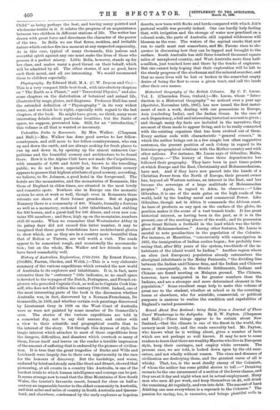History of Australian Exploration, 1788 - 1888. By Ernest Favenc. (Griffith, Ferran,
Okeden, and Welsh.)—This is a very elaborate summary of the various expeditions which revealed the new world of Australia to its explorers and inhabitants. It is, in fact, more extensive than its " centenary " title indicates, as no small space is devoted to the voyages of the Dutch, Portuguese, and French ex- plorers who preceded Captain Cook, as well as to Captain Cook him- self, who does not fall within the century 1788-1888. Indeed, one of the most interesting parts of the book is the discussion whether Australia was, in fact, discovered by a Norman-Frenchman, De Gonneville, in 1503, and whether certain rock paintings discovered by Lieutenant Grey in 1838 on the West Coast of Australia were or were not painted by some member of De Gonneville's crew. The stories of the various expeditions are told in a somewhat dry, not to say dull manner, and rather with a view to their scientific and geographical results than to the interest of the story. Yet through this dryness of style, the tragic interest which attaches to most of those expeditions from the dangers, difficulties, and disasters which overtook so many of them, forces itself and leaves on the reader a terrible impression of the amount of suffering that is endured by the pioneer of civilisa- tion. It is true that the great tragedies of Burke and Wills and Leichardt were largely due to their own impetuousity in the race for the honours of discovery. But the hardships, and worse, endured by tried andsteady men like Sturt and Stuart, showed that pioneering, at all events in a country like Australia, is one of the hardest trials to which human intelligence and courage can be put. It seems strange now to read that the Blue Mountains of New South Wales, the tourist's favourite resort, formed for close on half-a- century an impassable barrier to the oldest community in Australia, and that miles and miles of country in South Australia and Queens- land, and elsewhere, condemned by the early explorers as hopeless deserts, now teem with flocks and herds compared with which Job's pastoral wealth was poverty indeed. One can hardly help feeling that, with irrigation and the storage of water now practised on a colossal scale, the parts of Australia still reputed wilderness will blossom as the rose. The waters of the myriad creeks that now run to earth must rest somewhere, and Mr. Favenc rises to elo- quence in discussing how they can be tapped and brought to the surface. South Australia has still three hundred thousand square miles of unexplored country, and West Australia more than half- a-million, just touched here and there by the tracks of explorers. But one cannot help hoping that their exploration will be left to the steady progress of the stocksman and the mineral searcher, and that no more lives will be lost or broken in the somewhat empty desire of being the first to cross a given tract, and call the lands after their own names.


















































 Previous page
Previous page